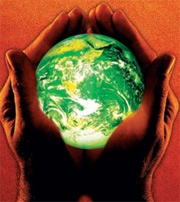Rational Environmentalism

How to vote blue to go green?
It has been a busy weekend, both politically and on the Rugby front, but I did pause in my preparations for England's game yesterday when I heard something on the radio that actually made sense, and made a note to listen to the programme in full today.
Yesterday's 'Talking Politics' on Radio 4 was the last of the current season as normal Westminster service resumes, and tackled the thorny questions around climate change, but not from the normal dogmatic BBC position. It does appear that on this subject at least, some semblance of impartiality has returned.
The 'Listen Again' archive for the show is here and it can also be downloaded as an MP3 podcast here.
The programme features an interview with “Sceptical Environmentalist” Bjorn Lomborg, in which he makes his case in a concise, powerful and highly convincing manner. For those who don't know Lomborg's line on how even if you accept man made climate change as fact, that currently approaches to dealing with it are backwards looking and come at an unacceptable human cost, I would suggest you take a listen. For those already au fait with the Lomborg manifesto there are a couple of nice digs at Al Gore to enjoy.
Focus group guru, Frank Luntz, has some fascinating insights in to green issues from a Conservative perspective. He looks at how David Cameron can take the popularity boost that his espousment of green politics has given himself and the party, and look to move from this to truly effective policy without relying on the current 'tax and punish' thinking that dominates the mindset of environmentalists of different political hues.
Finally the panel discussion features Fraser Nelson of The Spectator, Peter Hitchens, who, I'm sure purely by accident, makes the occasional constructive contribution, and they even manage to find a Green party spokesperson, Jenny Jones, who seems to be some distance from the flat-earth, anti-human wing of her party.
I'm not all that interested in green politics most of the time. As I've posted before, I have a deep distrust of some of the green lobby's policy of non-debate on the science of climate change. Another source of scepticism comes from my memories of being told in high school that we had to conserve fossil fuels as they would run out in the first decade of the 20th century. Except of course, they haven't, and we have found massive new reserves and technologies to exploit them. I can't help feeling that the emergence of a new problem, requiring exactly the same solutions once the old argument lost its potency was just a little too convenient.
I buy more into the arguments about security of energy supply, but I guess this is a harder line to push. If you ask the man in the street if he's worried that his gas bill is kept down only by buying from a sometimes hostile Russia, he'll shrug his shoulders and say 'so what?'; ditto petrol from the Middle East. A nice little story line about the end of life on Earth as we know it is a much easier message to infiltrate into the public's consciousness.
Like some of the comment in the programme, I did like the subtle shift of Tory green policy, putting it under the general 'security' banner.
For all my general scepticism, I did enjoy this show. Many of the points put forward would apply equally to tackling security of energy supply, and the moral case that we should tackle other global problems of higher priority first was very powerful.
For once, well done the BBC.





 RSS Feed - Main Blog
RSS Feed - Main Blog







No comments:
Post a Comment